
By KENNETH LIPP/YachatsNews
Three veterans are nearing completion of a self-assigned rescue mission.
The trio of former Marines will arrive in Newport on foot Saturday, 10 days after the anniversary of Japan’s attack on Pearl Harbor, and six months after leaving Boston Harbor on the anniversary of the Allied invasion of Normandy.
Their trek across 3,365 miles of U.S. Highway 20 is to raise awareness of veterans killed or missing in action and help identify and recover combat veterans’ remains from overseas. The trio’s effort – dubbed The Long Road – has been followed by hundreds of thousands if not millions on social media and garnered donations of more than $170,000 as of Thursday.
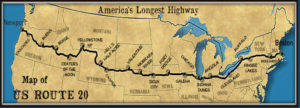
In traversing 12 states, Coleman “Rocky” Kinzer and Justin “JD” LeHew walked through Chicago and midwestern cities in the heat of summer. As the summer faded, Ray Shinohara joined them in Elgin, Ill. to cross the wind-swept expanses of the Great Plains. They climbed and descended the Rocky and Cascade mountain ranges in late fall, taking turns leapfrogging the other two behind the wheel of a 1985 RV that has served as their support vehicle since Iowa.
All three served together in the 3rd Marine Regiment in Hawaii, with 67 years of service in the Corps between them.
YachatsNews caught up with the trio Thursday between Eddyville and Toledo and walked with retired sergeants major LeHew and Kinzer, some on roomy shoulders and some on narrow gravel slivers with only a creek down a ravine as an escape route.
LeHew said a cold, sunny day in the Coast Range wasn’t near the worst conditions of their journey one-eighth of the way around the world.
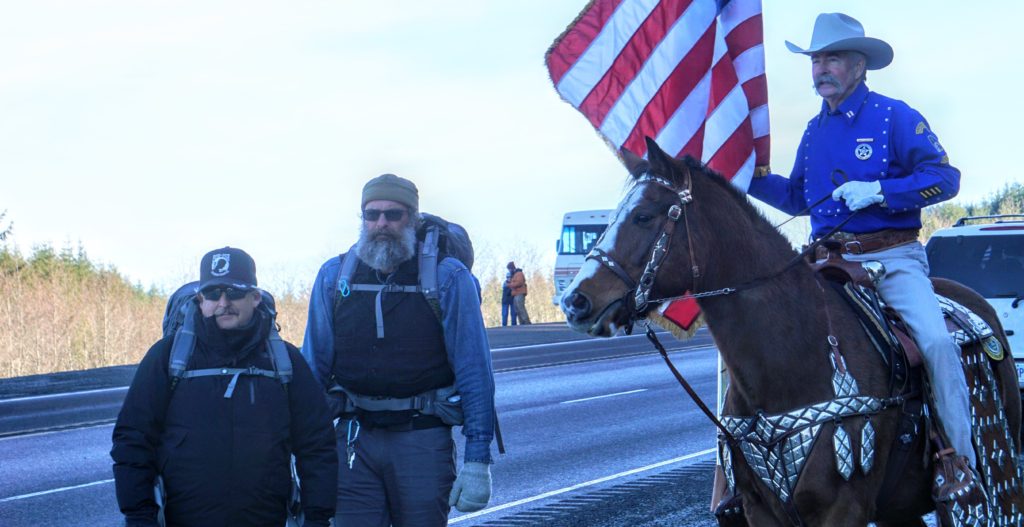
The mission
It started with a conversation among friends after an incident at a post office in which a man did not understand the meaning of POW/MIA flag flown there, a feature of every federal building. LeHew said he realized how little awareness there was about the black and white flag and military members missing in action or taken prisoner in war.
The 52-year-old from Fredericksburg, Va., is the chief operating officer of History Flight, a nonprofit founded in 2003 that supplements the federal government’s efforts to identify remains of missing, presumed dead U.S. military personnel overseas and arrange for their transportation stateside for burial.
He and his brothers-in-arms decided to embark on the cross-country journey on Highway 20, to bring attention to unaccounted for military personnel, honor all those who lost their lives at war and promote History Flight – as well as get an up-close look at the country along its longest highway.
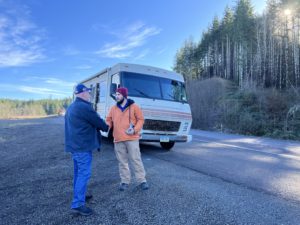
“I absolutely understand why people have kind of lost focus,” LeHew said Thursday as Kinzer, 45, of Kailua, Hawaii, walked several feet ahead and out of earshot due to noise from traffic. “Because even though we just fought 20 years of warfare in America’s longest war, we didn’t have prisoners of war who just languished for years. And for the most part, we didn’t bury any of our dead on foreign soil. We brought them all home.”
Even so, there are more than 81,000 U.S. military personnel unaccounted for since World War II, LeHew said. About 1,000 are from Oregon.
During the Vietnam War, he said, many people knew of someone who disappeared overseas. LeHew learned about three Vietnam casualties among locals from Bruce Tompkins of Eddyville, president of the Oregon Governors Mounted Guard, who met up with the pair on horseback as they passed through east Lincoln County. Tompkins told him three families nearby, neighbors, each lost sons.
“Then you see World War II, those casualties are on just such a mind-boggling scale,” LeHew said, “where entire high school classes were wiped out. People don’t see that anymore.”
On the long road
“There’s a reason people like to walk the Appalachian Trail or the Pacific Crest Trail,” LeHew said over the roar of a passing semi. “When you’re walking a highway, you don’t get a break. You have to watch that road all the time.
“You stay really alerted to when you see guardrails,” he said. “They’re barriers to escaping an oncoming vehicle.
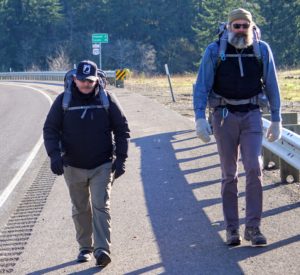
When they first started, they were only averaging about 10 miles a day and were often left with blisters and extreme soreness. LeHew said their bodies gradually adjusted, they streamlined their operation, and ended up averaging 20 miles a day.
In the Midwest, they sweltered in 100-degree heat and high humidity.
Someone called the police on them in Galena, Ill., but LeHew said the officer and community members ended up apologizing to them for the trouble, telling them that stretch of Highway 20 through town was populated by second-home owners from Chicago who didn’t represent the community.
In Nebraska and Wyoming, LeHew said, the walking space was often wide, but winds 40 mph or higher blew them all over the road. Sometimes the walking area would be just the rumble strip, a painful surface for extended hiking.
After months of sleeping outside (when not taking occasional breaks in motels), they bought the unheated RV in Iowa to protect them from the elements. The RV’s age also turned out to be a bit of a liability, LeHew said, forcing repeated stops for repairs, many of which LeHew could perform thanks to his military mechanic experience.
When they reached the eastern gate of Yellowstone National Park, rangers closing the road for winter let them through – and they became the only traffic for 80 miles. A herd of bison bid them ado at the western gate. Their path skirted the Craters of the Moon in Idaho and passed through Boise into Oregon, where Highway 20 is called the Medal of Honor Highway.
They received a hero’s welcome in many towns. At Independence, Mo., LeHew said, school children came outside and lined the road as they walked, a scene repeated in other towns. At least two dozen drivers on the highway Thursday recognized the hikers and honked their horns.
Even when Shinohara, a 38-year-old retired sergeant from Guam, pulled the Long Road Team’s sputtering RV to the side of the highway Thursday, people would stop to take a selfie with him or quietly hand over a card or donation.
One of those was Don Reed of Eddyville, who caught up with Shinohara after the group passed his home that morning. A Navy veteran, Reed gave Shinohara a $100 bill and told him about his uncle, Marine Sgt. Tom Schriver of Elk City who was killed in Vietnam in 1968.

The road’s end
The group was taking it slow Thursday and took extended stops as their brisk pace had them ahead of schedule for their planned arrival in Newport. The RV is on its last legs and will be decommissioned.
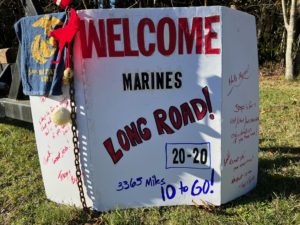
Newport plans to fete them as they end their journey.
A welcoming party will line West Olive Street near the American Legion hall as the men approach at 1 p.m. Saturday and continue down the street to the Vietnam Veterans Memorial overlooking Nye Beach. Kinzer’s and LeHew’s families flew into Portland Thursday to greet them in Toledo and prepare for the walk into Newport.
“I hope all 10,000 residents of Newport line up along Olive Street,” said Mayor Dean Sawyer.
A $15 spaghetti feed from 4-7 p.m. Sunday at the National Guard Armory will benefit History Flight. The meal is being donated by the American Legion.
As the men crossed the country, The Long Road’s Facebook page was flooded with invitations to homes, free meals at restaurants and complimentary hotel rooms and RV spots. Newport was no different. Most of their in-town plans — including sightseeing, meals and accommodations — were settled at least a month ago, LeHew said.
LeHew said it was hard to believe he was about to see the counterpart to the sign he saw as they left Boston Harbor – Newport/Boston 3,365 miles.
- Kenneth Lipp is YachatsNews’ full-time reporter and can be reached at KenLipp@YachatsNews.com




What a wonderful article you wrote about the Long Road journey.
I knew they got the Winnebago van in Iowa, where I’m from, but did not know it was not heated, especially going through all the states with bitter, winter cold, windy situations, etc. Again, through your detailed article, I learned so much more than from other posts/articles. Well done!
Betty Gordon, Ames, Iowa donator/follower since Iowa